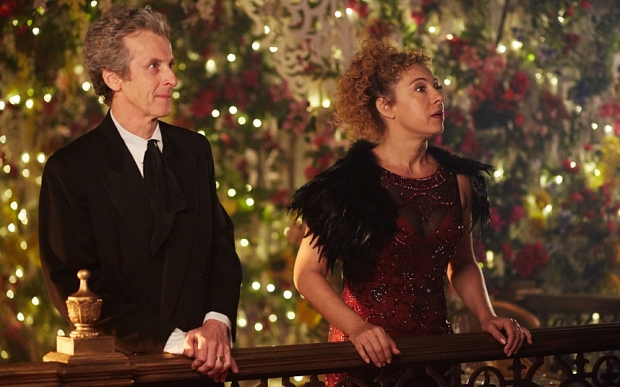“All the world’s a stage”: Dramatis Personae
An often overlooked entry from the first season, “Dramatis Personae” was always one of my favourite episodes to think about, even if this time around I found it a little difficult to actually watch. As is increasingly the case, the reason for this is not so much due to the quality of the piece itself as much as the fact it’s dealing with televisual storytelling norms that I find myself less and less inclined to watch as I get older.
The title says it all: “Dramatis Personae” is an exploration of performative themes, which on the one hand is nothing new, but on the other this episode is more textually overt about it than most. Writer Joe Menosky’s original idea was inspired by his observation that people tend to follow a kind of socially approved (and very, very stock) script whenever major life events happen, and there seem to be a very slight number of scripts generally available. This means that, no matter how different and unique the individual circumstances are, absolutely everyone’s story about, for example, falling in love is going to sound exactly the fucking same. Menosky saw this as a kind of voluntary self-imprisonment within a very bad pulp fiction play, and he was interested in exploring what that was like and why it happened. In a Star Trek context, this theme took the form of a telepathic matrix that was transmitted like a a virus.
For my money, this is a genius concept and a perfect fit for Star Trek: Deep Space Nine. As a kind of science fiction urban community, the show offers a great setting to explore how this manifests on the level of populations and, even though this episode doesn’t end up taking the approach that “Babel” did, dealing with a disease outbreak is a solid plot to throw at a team of scientists and administrators working in a metropolitan environment. The handling of performativity itself “Dramatis Personae” does mark an interesting evolution from the way it’s been handled in the past: On Star Trek: The Next Generation, much of the performative facade comes from the cast themselves looking for room to play around with the roles they’ve been given, although at this stage the show is finally beginning to fully plumb the recesses of its sham theatricality, and this will come to a charged head next season. Here though the performativity is a crucial aspecct of the textual narrative, and that’s not actually something we’ve seen a ton of to date, although, like I said, this is starting to change.
With “Dramatis Personae” Menosky has in a sense penned a kind of spiritual follow-up to “Frame of Mind”, where the extradiegetic themes about being imprisoned in a stock set of narrative tropes become diegetic. The form this takes on Star Trek: Deep Space Nine is a bit more straightforward and traditional than what Brannon Braga pulled on Star Trek: The Next Generation, with the crew literally being taken over by other characters as opposed to the structure of the narrative reality itself breaking down (which is, interestingly enough, a certain kind of theatrical approach).…


 Right. Loads of stuff. First off, just a heads up, I’m bumping Last War in Albion one more week because I decided I don’t want to launch a new chapter on a holiday and then drop a Sherlock review on top of it later in the day. There’ll still be Friday morning content though.
Right. Loads of stuff. First off, just a heads up, I’m bumping Last War in Albion one more week because I decided I don’t want to launch a new chapter on a holiday and then drop a Sherlock review on top of it later in the day. There’ll still be Friday morning content though. We’ll start with the stories ranking, with letter grades assigned, and then finish with some general thoughts on the season.
We’ll start with the stories ranking, with letter grades assigned, and then finish with some general thoughts on the season.
 Box Day, as it were.
Box Day, as it were. An effective holiday farce that serves as a fitting end to the story of River Song. It’s not much more than that, but it makes no claim to be, and you can hardly fault a Christmas special for its froth. So, all told, good episode.
An effective holiday farce that serves as a fitting end to the story of River Song. It’s not much more than that, but it makes no claim to be, and you can hardly fault a Christmas special for its froth. So, all told, good episode.
 Take time off from wading through the flooded ruins of your home and join the entire ‘inner party’ (as it were) of Eruditorum Press – Holly, myself, James, Jane, Kevin and Phil – for Shabcast 14, a massive festive blather-session. (Anna was invited, but was too tired from doing little things like, y’know, fixing the site.)
Take time off from wading through the flooded ruins of your home and join the entire ‘inner party’ (as it were) of Eruditorum Press – Holly, myself, James, Jane, Kevin and Phil – for Shabcast 14, a massive festive blather-session. (Anna was invited, but was too tired from doing little things like, y’know, fixing the site.) Chew #53
Chew #53